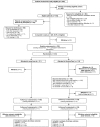A Randomized Controlled Trial of a Nurse-Led Supportive Care Package (SurvivorCare) for Survivors of Colorectal Cancer
- PMID: 27306909
- PMCID: PMC4978555
- DOI: 10.1634/theoncologist.2015-0533
A Randomized Controlled Trial of a Nurse-Led Supportive Care Package (SurvivorCare) for Survivors of Colorectal Cancer
Abstract
Introduction: Colorectal cancer (CRC) and its treatments can cause distressing sequelae. We conducted a multicenter randomized controlled trial aiming to improve psychological distress, supportive care needs (SCNs), and quality of life (QOL) of patients with CRC. The intervention, called SurvivorCare (SC), comprised educational materials, needs assessment, survivorship care plan, end-of-treatment session, and three follow-up telephone calls.
Methods: At the end of treatment for stage I-III CRC, eligible patients were randomized 1:1 to usual care (UC) or to UC plus SC. Distress (Brief Symptom Inventory 18), SCNs (Cancer Survivors' Unmet Needs measure), and QOL (European Organization for Research and Treatment of Cancer [EORTC] QOL questionnaires C30 and EORTC CRC module CR29) were assessed at baseline and at 2 and 6 months (follow-up 1 [FU1] and FU2, respectively). The primary hypothesis was that SC would have a beneficial effect on distress at FU1. The secondary hypotheses were that SC would have a beneficial effect on (a) SCN and QOL at FU1 and on (b) distress, SCNs, and QOL at FU2. A total of 15 items assessed experience of care.
Results: Of 221 patients randomly assigned, 4 were ineligible for the study and 1 was lost to FU, leaving 110 in the UC group and 106 in the SC group. Patients' characteristics included the following: median age, 64 years; men, 52%; colon cancer, 56%; rectal cancer, 35%; overlapping sites of disease, 10%; stage I disease, 7%; stage II, 22%; stage III, 71%. Baseline distress and QOL scores were similar to population norms. Between-group differences in distress at FU1 (primary outcome) and at FU2, and SCNs and QOL at FU1 and FU2 were small and nonsignificant. Patients in the SC group were more satisfied with survivorship care than those in the UC group (significant differences on 10 of 15 items).
Conclusion: The addition of SC to UC did not have a beneficial effect on distress, SCNs, or QOL outcomes, but patients in the SC group were more satisfied with care.
Implications for practice: Some survivors of colorectal cancer report distressing effects after completing treatment. Strategies to identify and respond to survivors' issues are needed. In a randomized controlled trial, the addition of a nurse-led supportive care package (SurvivorCare) to usual post-treatment care did not impact survivors' distress, quality of life, or unmet needs. However, patients receiving the SurvivorCare intervention were more satisfied with survivorship care. Factors for consideration in the design of subsequent studies are discussed.
Keywords: Colorectal cancer; Distress; Nurse; Quality of life; Randomized controlled trial; Survivors.
©AlphaMed Press.
Conflict of interest statement
Disclosures of potential conflicts of interest may be found at the end of this article.
References
-
- Torre LA, Bray F, Siegel RL, et al. Global cancer statistics, 2012. CA Cancer J Clin. 2015;65:87–108. - PubMed
-
- DeSantis CE, Lin CC, Mariotto AB, et al. Cancer treatment and survivorship statistics, 2014. CA Cancer J Clin. 2014;64:252–271. - PubMed
-
- Pettersson G, Berterö C, Unosson M, et al. Symptom prevalence, frequency, severity, and distress during chemotherapy for patients with colorectal cancer. Support Care Cancer. 2014;22:1171–1179. - PubMed
-
- Baker F, Denniston M, Smith T, et al. Adult cancer survivors: How are they faring? Cancer. 2005;104(suppl):2565–2576. - PubMed
-
- Arndt V, Merx H, Stegmaier C, et al. Quality of life in patients with colorectal cancer 1 year after diagnosis compared with the general population: A population-based study. J Clin Oncol. 2004;22:4829–4836. - PubMed
Publication types
MeSH terms
LinkOut - more resources
Full Text Sources
Other Literature Sources
Medical


